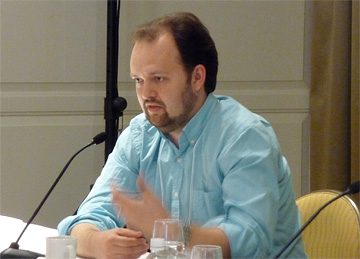In my last post, I began to comment on Ross Douthat’s new book, Bad Religion: How We Became a Nation of Heretics. Well, actually, I focused on a recent interview Douthat did with Christianity Today. He does believe that much of American religion, Christianity, in particular, is “bad” because we have lost touch with Christian orthodoxy and with the institutions (churches, denominations) and guard and pass on classic Christian truth.

In the last couple of days, I’ve been attending the Faith Angle Forum in Florida. As it turns out, Douthat was one of the featured speakers. He is as good in person as in writing, which made for an engaging conversation about the state of religion in America. Whether you agree with Douthat or not, he is a valuable contributor to this dialogue and I hope he continues to express his views on the matter.
Anyway, back to Christianity Today. In the interview, Douthat was asked: How can we begin to address a nation of heretics? “We,” in this question, means “we who believe ourselves to be orthodox Christians.” Here is Douthat’s telling answer:
There has been much healthy Catholic and Protestant dialogue and cooperation during the past 30 years. But ultimately the success of U.S. Christianity depends on individual churches and confessions, not on ecumenism for ecumenism’s sake. Protestants and Catholics need to recognize everything we have in common and then say we’re also going to focus on building separate effective churches.
Christianity’s failure in the United States is an institutional failure, and the answer to institutional failure is stronger institutions. America has more to gain from a more potent Protestantism and Catholicism than it does from even the most fruitful Protestant-Catholic dialogue.
For evangelicals, it means thinking more seriously about ecclesiology and what it will take to sustain Christianity across generations. Promise Keepers, Campus Crusade for Christ, and other parachurch groups have been important to evangelicalism. But “parachurch” makes sense over the long term in the context of a church. The danger for evangelicalism is becoming too parachurch without enough church. Some megachurches seem to function like parachurches rather than churches, as though everything else that’s going on is more important than the central life of the community of worship. It might be important for evangelicals to think of themselves as Presbyterians, Baptists, and so on, and recover the virtues of confessionalism, because it’s confessions, not just superstar pastors, that sustain Christianity over the long haul.
I think Douthat is substantially right. Though it’s popular these days to love Jesus and hate the church, in fact, the church is the context in which the truth about Jesus is told and passed on. It’s the context where Jesus is honored and worshiped. You cannot ultimately have a vital, sustainable Christian faith apart from the church.
I take seriously Douthat’s recommendation for evangelicals. I agree that we need to do much more thinking about ecclesiology (the understanding of the church). Though parachurch organizations can help to revitalize and strengthen the church, they should not suppose to replace it. As you may know, I work for a parachurch organization (Foundations for Laity Renewal). One of the reasons I joined this organization had to do with its longstanding commitment to support and partner with the church (in the form of particular churches).
By the way, if you’re looking for some serious reflection on the church and its relationship to Christian faith, I would recommend an outstanding book by my friend Tod Bolsinger. It Takes a Church to Raise a Christian: How the Community of God Transforms Lives has been well-received in a wide range of contexts: churches, small groups, seminaries, pastors’ retreats, etc. You can also find lots of insights about the church on Tod’s blog.
In my next post, I want to think with you about why the notion of “heresy” is an important one, even if it isn’t especial PC these days.











